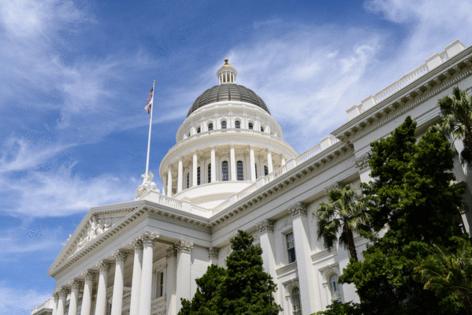'It's about time': California creates reparations agency for descendants of enslaved people
Published in News & Features
New legislation authored by a San Diego lawmaker and just signed by Gov. Gavin Newsom creates an agency that will take key first steps toward reparations for Black Californians whose ancestors were enslaved — and toward what advocates say is repairing the lasting harms of American slavery.
Senate Bill 518, authored by state Sen. Akilah Weber Pierson, creates the Bureau for Descendants of American Slavery, which will oversee the process of reparations, including verifying Californians’ eligibility and coordinating future reparative-justice initiatives.
Reparations can include compensation and other resources for the descendants of enslaved people in an effort to offset the disadvantages Black Americans have faced as a result of slavery and systemic racism, including discrimination in housing, education and the criminal justice system.
“This is monumental success … that we have done here in California,” Weber Pierson said. “It’s something that those who are descendants of American chattel slavery have been fighting for since the Emancipation Proclamation.”
Local historian and genealogist Yvette Porter Moore summed it up, saying, “It’s about time.”
Newsom signed another bill this week, also proposed by Weber Pierson, that allocates $6 million to the California State University system to research how to confirm a person’s genealogical history to verify if they are descendants of enslaved people and confirm eligibility for reparations.
But the governor’s approval of the two bills came just as he vetoed five other reparative-justice bills on Monday, including one that would have given descendants of enslaved people preference in college admissions and another that would have set aside money for first-time homebuyers who are descended from enslaved people.
Weber Pierson said she doesn’t see the vetoed legislation as a “door shut,” but instead as items that can be explored again in a future legislative session.
“I did not expect for all of our bills to get through,” she said. “If that had happened, that would have been amazing as well. But that is just not how the legislative process usually works.”
For Ellen Nash, who chairs San Diego’s chapter of the Black American Political Association of California, the governor’s vetoes were “disappointing” — but she hopes the new state agency will help facilitate future reparative-justice efforts.
“As residents of California, we got a lot of work to do,” Nash said. “We’ve got to hold the bureau accountable … and make sure the work is done.”
SB 518 and the other legislation from the California Legislative Black Caucus stems from a set of recommendations the state’s Reparations Task Force made and published in a 2023 report.
That task force, created in 2020, was the first of its kind in the nation to survey the ongoing impacts of slavery on Black Americans and to explore reparation proposals.
California entered the U.S. as a free state in 1850, but its early government supported slavery, the task force report noted. Even after the abolition of slavery, California engaged in practices that prevented Black Americans from owning homes and businesses and suppressed their right to vote and develop political power.
There is currently no legislation that would provide direct payment to descendants of enslaved people — but advocates hope the creation of the bureau will help move the needle toward actual reparations.
“We, as Californians, are still ahead of the pack when it comes to this discussion and establishing some real recommendations,” said county Supervisor Monica Montgomery Steppe, who served on the task force.
“My hope is that Black San Diegans hold on to that and continue their advocacy for seeing this through to the very end, so that it can impact generations to come,” she added.
Secretary of State Shirley Weber, who is also Weber Pierson’s mother, authored the bill that led to the creation of the task force when she was in the state Assembly in 2020.
This week, she said that through the process of establishing the task force, it became clear that the reparations effort needed a centralized group to provide the basis for future reparation efforts to fall under.
“I think that’s what this bill is about — getting the foundation, getting a central force,” Weber said.
The California Legislative Black Caucus tried last year to pass a bill that would have established a reparations agency, but the measure failed.
The Bureau for Descendants of American Slavery will include divisions focused on genealogy, education and outreach and legal affairs. It will need a director and staff — which Weber Pierson said will be the next step to get the agency up and running.
It will likely be years before Californians can begin to apply for reparations through the agency, but historian Moore encourages Black San Diegans to begin looking into their ancestry.
It can require thorough research, Moore said. Enslaved people may not be listed in Census data but could have been listed in slaveowners’ tax records, trusts or insurance paperwork.
Even then, enslaved people may not have been listed in documents by name.
When Moore traced her own family’s lineage, she said the experience put faces and names to the dark history of slavery and made it feel more real.
It’s history that should be remembered, she said, especially as the federal government moves to erase Black history.
“But it’s still a reality, and it affects many people in households,” she said. “We didn’t have an even running field, we didn’t get the same start as other people have, and it’s generational.”
_____
©2025 The San Diego Union-Tribune. Visit sandiegouniontribune.com. Distributed by Tribune Content Agency, LLC.







Comments